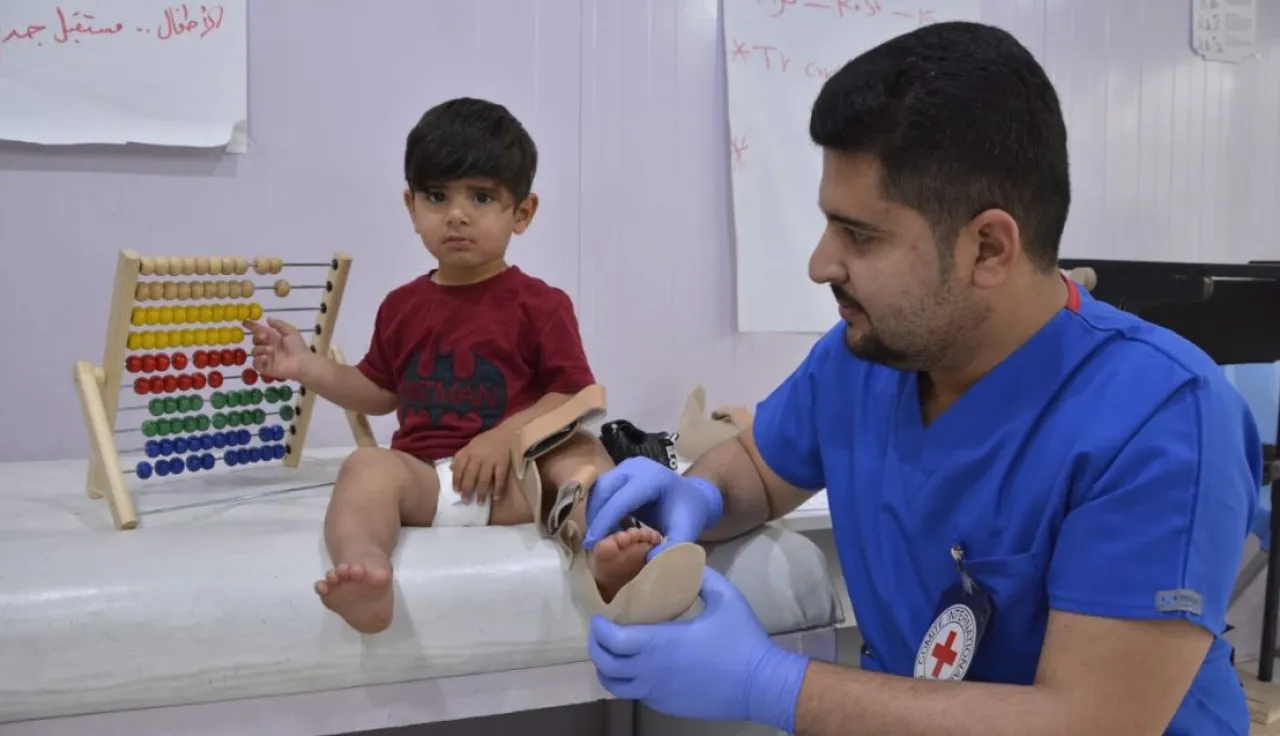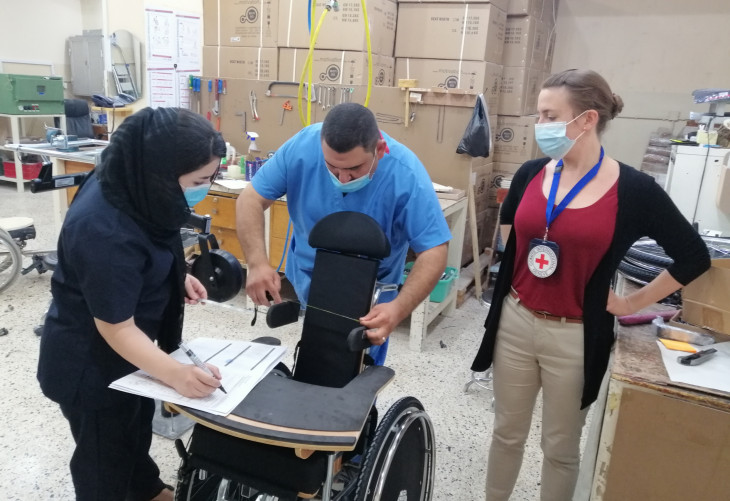"It’s a privilege to help people regain their independence"

An ICRC delegate from Murroe, Co. Limerick, describes her role working in Erbil.
Rieke Grainne Hayes is a physiotherapy team leader in the ICRC-run Erbil Physical Rehabilitation Centre in the Iraqi Kurdistan Region.
A busy team

Rieke (right) with Shaema (wheelchair technician) and Omar (physio) preparing a specialized wheelchair for a child with cerebral palsy
"I have nine physiotherapists and two wheelchair technicians in my team.
"My main work involves managing my team at the centre, and I also participate in assessments and treatments of the more complex cases we see.
"I arrived in Iraq at the end of September 2019. I've been here almost one year and have just agreed to stay a further six months until the end of March 2021."
Achieving the best quality of life for our patients
"Being a physiotherapist, regardless of the country you practice in, can be incredibly rewarding.
"It can be demanding, and it can be tiring, but helping people attain the best quality of life even in the face of long term conditions, to put them on the path to full recovery, and enabling people to be independent is all the motivation you need to go to work each day.
"A wheelchair can help a child with cerebral palsy go to school, a prosthesis can restore complete independence in a person, and our clinic can correct club foot in children before it has the chance to become a disability.
"There is a certain privilege to facilitating that process for someone."
A long journey to get help
"You see the same drive in all our ortho-prosthetists and physiotherapists – the desire to help anyone coming to the centre to achieve the best quality of life with the skills and aids at our disposal.
"People often travel a long way to come to our centre, and the team feel the responsibility very strongly to do as much as they can for them and to do it well."
Landmines.
Cluster munitions.
Explosive devices.
Nearly 40 years of war has left Iraq riddled with unexploded devices. More than in any other country in the world.
The human cost of this is devastating. pic.twitter.com/v6ERfy1Nmk— ICRC (@ICRC) January 23, 2020
Developing skills
"I try to avoid getting over-involved in the team's daily tasks. Instead I support them by providing the opportunities and support their development, so that they become more independent and assume greater responsibility.
"A new centre is currently being built in Erbil and should hopefully be finished by the end of 2021. The goal is gradually to have a resident physiotherapist assume the team lead position, so over the next year we're providing training and experience to support members of the present team to take on a greater role in leadership of the physiotherapy department."

© Mustafa Aziz ICRC - Physio, Akam, fitting a child with club foot with a brace.
From Korea to Kurdistan
"On each mission the challenges are different; the home environments, support services and, also, health conditions, but professionally it's important to be challenged and it's humbling too. As much as I teach my staff, they teach me too.
"I enjoy getting outside my comfort zone! My first mission was in DPR Korea and second was Iraq. Two completely different countries, languages, cultures and history.
"It's fascinating, because it's always new and at first you see the differences between them all (and home) but with time you start to see all the similarities also– they just aren't dressed the same."
Adapting to life in Erbil

The whole team!
"One of the things I've had to adapt to here, is that so many public holidays are announced last minute - cue frantic rescheduling of patient appointments!
"I sometimes create three different rotas for a single week to prepare for different holiday scenarios. I like a nice plan and schedule, you see, so this is especially maddening to me.
"My staff laugh whenever I go into a tirade about this.
"Of course more recently, with the COVID-19 pandemic, there have been frequent changes in curfews and lockdowns which impact how and when we open the centre. I am very proud of how the team in the centre adapted to a new way of working once we reopened after the initial lockdown in March."
The impact of COVID-19

"The pandemic has obviously had an impact on our work here. Lockdowns, airport closures, travel bans between governates, quarantines, PPE, and social distancing have impacted hugely the services we provide and us as delegates, of course. Many of us in Iraq didn't go home and see our families for over six months.
"We fully shut the centre for six weeks in March and since we reopened we've not had more than 40% of staff working at the centre at any given time.
"Social distancing measures mean we need to limit the service users coming to the centre at any given time. This has had a massive impact on the numbers of people that we can see and provide services for. For now, there is also no end in sight and the best laid plans are ever subject to change.
"On a positive note, we are still open and still continue to provide services."
You could work with me
"I'd like more people back home to know that they can work with the ICRC. I don't think there's an understanding that you can be a field delegate, or in logistics with the ICRC, or that there are opportunities to work as an engineer, a nurse, HR, admin, or translator.
"I genuinely had no idea that the ICRC hired physiotherapists. I was very passionate to work in the humanitarian sector but thought the only way to do so was through volunteering –a great learning experience but ultimately not a viable long-term career option. So, discovering that I could have a career with the ICRC was incredibly exciting door opening in my life."
A taste of home
"Similarities between here and Ireland? – the hospitality. If Father Ted's Mrs Doyle was a geographical region, she would be Kurdistan. The food, coffee and tea you get plied with is immense, but also a comforting and familiar reminder of home.
"The people here are also not so dissimilar to the Irish. Friendly, helpful, generous and playful – there is a lot of banter and good-natured teasing at work. They can give as good as they can get, that's for sure."



